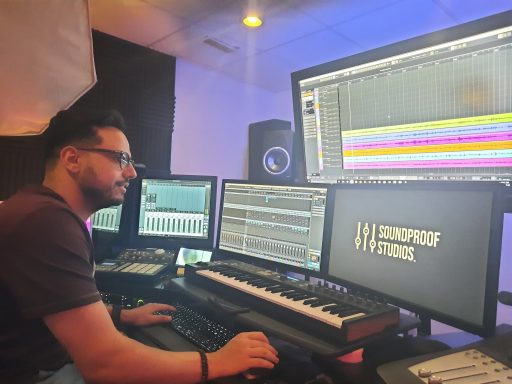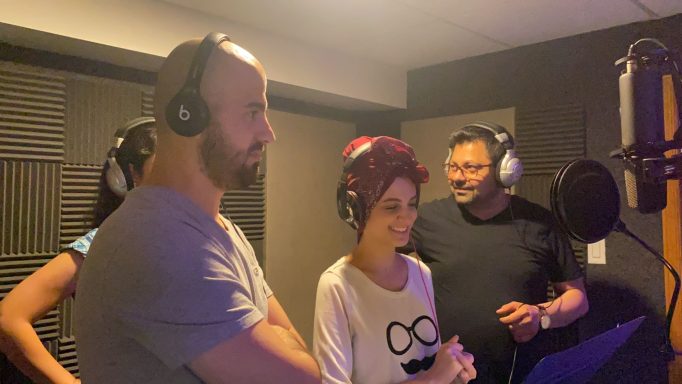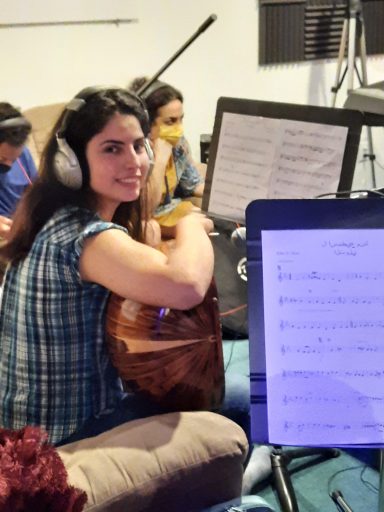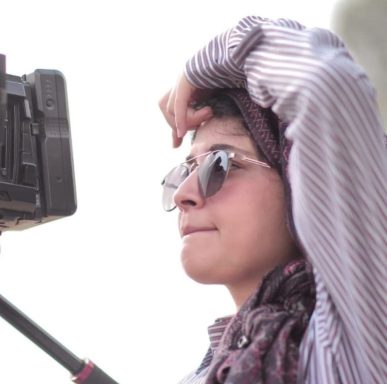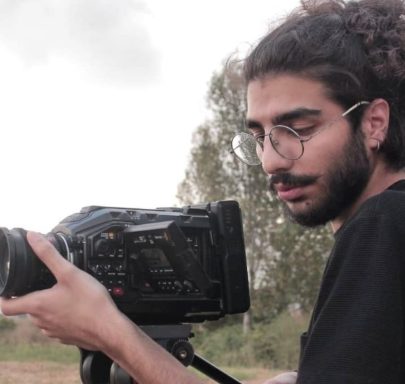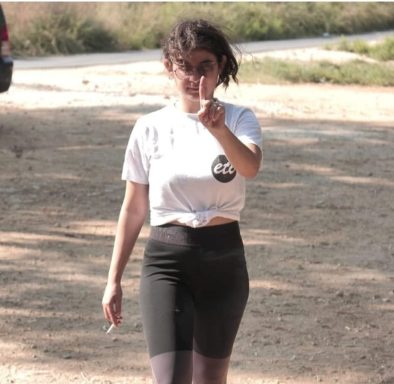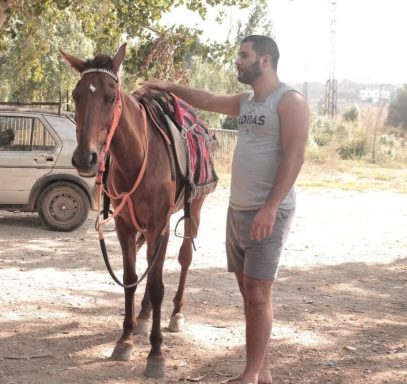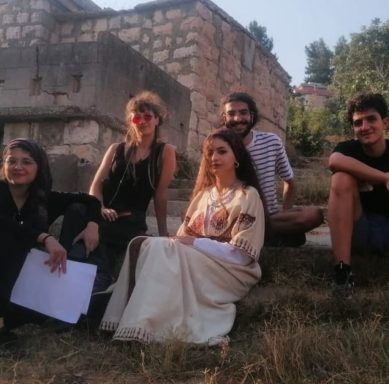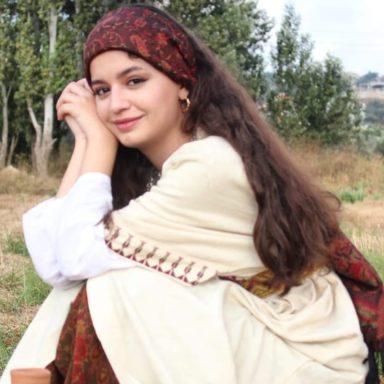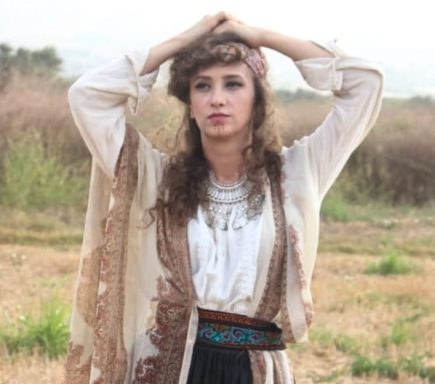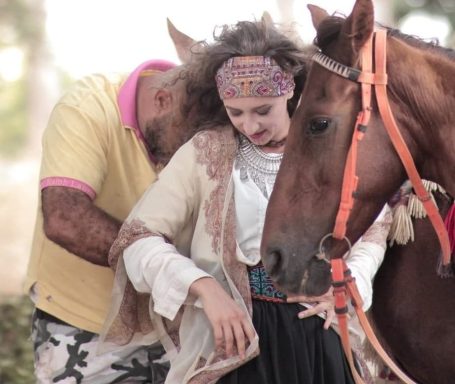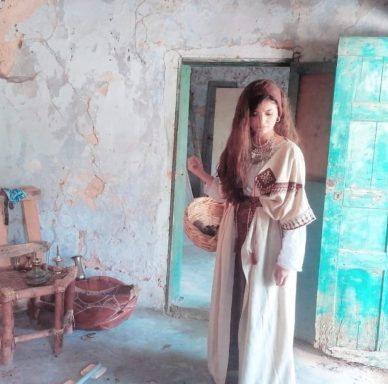The making of 'I cannot Escape You'
'I cannot escape you' is an experimental project that brought together more than more than 40 individual from three continents. The project is multidisciplinary and included different layers and forms of expression. The end result was an original composed song with a lyric and a music video.
Poetry
I cannot escape you/لا أستطيع منك التولي is a poem I wrote when I was at my lowest. The poem describes the raw emotions of a moment of vulnerability, weakness, helplessness and need. It was a time I could not feel the presence of God in my life and I was desperately trying to reconnect with him. This poem is a lover's reproach
Music
This project is considered to be Manar Naeem's first ever opportunity at composing. Manar contributed significantly to the development of the poem as some alterations to the words were necessary at times due to compositional purposes. You can read more about this journey in the poem explanation provided below. The music was arranged by musician Amir Khouri.

Animation
The song was releases in two forms: a lyric video and a music video. The lyric video was animated by the Syrian artist Maher Khedder.
Videography
The pre-production and production phases of the music video took place in the Aadysat village in Southern Lebanon with a 15 member crew! The music video was directed by Malak Zamzam. The director of Photography for the music video was cinematographer Hadi Hammoud.
The post production which involved editing and coloring took place is Istanbul, Turkey by Zein Obaida.
Lyric video
The lyric video animation was designed by animator Maher Khedder.
To learn more about the meaning behind the words, check the explanations below.
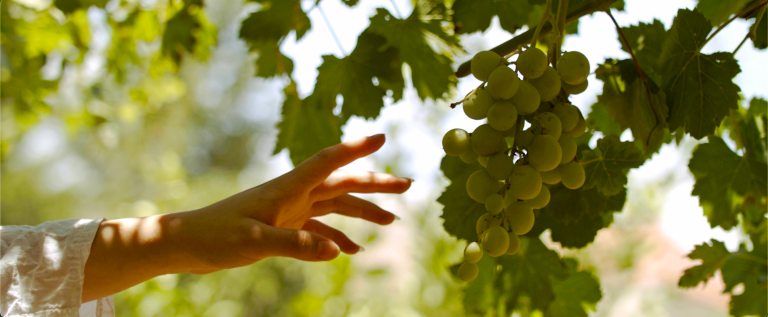
I cannot escape you/ لا أستطيع منك التولي
عناقيد العنب في إحدى الروايات الفلسطينية هي الدموع التي ذُرفت أسفاً على خطيئة آدم وحواء
Grapes in Palestinian legends are the tears of an angel who grieved over the sin of Adam and Eve.
This scene was an homage to Michael Angelo's The Creation of Adam.

التّولّي في الحربِ هو الهرب خوفاً من الموت. والحربُ هي النزال الشديد الذي إن لم تَقتل فيه، قُتلت. والنّفسُ هي المُنازل الشرس العتيّ المتكب. والحبُ هو المُنْية و الجهاد المُبتغى والموت المنتظر.أنا العبدُ الذليل أقف أمام نفسي مرتعشاً بعد أن عرّتني الخطايا، وبالرغم من ضعفي، أخوض الحرب حبّاً وتعلّقاً فإني لا أستطيع التّولي عن الحب شبراً

Al-Tawali in Arabic when used in context of war, is to escape out of fear of death. And war is a ruthless fight where you either kill or get killed. Nafs, one's self, is the fericious, invulnerable and arrogant foe. And love is the desired struggle and the awaited death. So, I, a humble slave, stand before my Nafs (my self) shivering after being stripped naked by my sins. Yet, I, while weak, would rather fight for the sake of love than not fight at all because I cannot escape love, even by an inch.
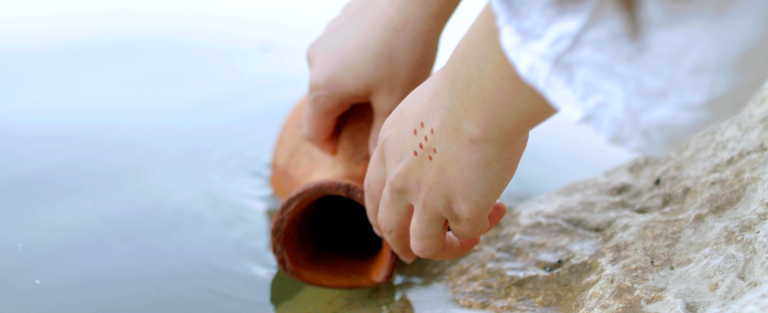
يا من منك بعضي وكلي/ O' you from whom comes part of me and my whole
According to historian Nasser Al Yafawi, Phoenicians tattooed their hands and faces with hennah as part of pagan rituals. When people died, their palms were painted with hennah before the burial. Later, it became part of women's ornamentation. Hennah designs had special meanings indicating family, love, fertility, land, status etc..
خلف الكواليس: الجملة الشعرية بالأصل هي: يا من فيك ملجأي ومأربي. ولكن اضطررنا لتعديل الجملة لما هي عليه الآن للضرورة التلحينية. في محادثة مع منار في معاني الجملة، اختلفنا على طبيعة علاقة المرء مع خالقه. منار ترى أن علاقة الإنسان مع خالقه أعمق من أن تتكوّن بسبب ماديّة الخلق. بالرغم من اتفاقي مع منار أن روحانيّة الارتباط بالله هي عنصر مهم في العلاقة مع الخالق، إلا أنه ليس العنصر الوحيد. وفي حال اعتبرنا أن العلاقة المادية المتمثلة بارتباطنا بالخالق لكوننا خُلقنا منه، هي أقل عمقاً وأضعف من العلاقة الروحانية، فهي لا تزال تتماشى مع الحالة العامة للمتحدث في القصيدة ألا وهي الوهن والضعف والتعطش للتقرب من الله بأي طريقة وإن كانت أضعف الارتباطات
Behind the scene info:
The original verse is: O, you in whom I find my shelter and my home.
However, the lyrics were changed by Manar for music compositional purposes. In a conversation with Manar about my explanation of the verse, we had a disagreement about the nature of one's connection to the creator. Manar thinks that the connection with the creator is deeper than the physical nature of being created by him. While I agree with Manar that the spiritual connection with the creator is of profound importance, I believe that the physical nature of our relation with God is as important. I do not think that one is stronger than the other. However, even if we are to consider that the physical connection is a less profound form of connection than the spiritual connection, it is important to remember that the speaker in the poem is coming from a vulnerable position and is seaking any form of connection with God.

إِذْ قَالَ رَبُّكَ لِلْمَلَائِكَةِ إِنِّي خَالِقٌ بَشَرًا مِّن طِينٍ * فَإِذَا سَوَّيْتُهُ وَنَفَخْتُ فِيهِ مِن روحِي فَقَعُوا لَهُ سَاجِدِينَ
أنا ككل جُبُلت بيد الله وأُحييت من روحه. تركتُ بعضاً مني لديه. وأنا الآن في أمسّ الحاجة لبعضي. فأعدني يا إلهي إليّ، أعد بعضي لكلي وأعدني إليك

[So mention] when your Lord said to the angels, "Indeed I am going to create a human being from clay." So when I have proportioned him and breathed into him of my [created] soul, then fall down to him in prostration".
I, as a whole, was kneaded by the hand of God and I was breathed into life from his soul. I left some of me with him. And now, I am in a despearte need for the rest of me. So God almighty, return myself to me, return the part of me to my whole and return myself to you.

أناشد قربك إليك قدني/ I implore you to be close, lead me to you.
Springs hold a significant importance in Palestinian culture. One held in high regards is the 5,000 years old Spring of Silwan in the city of Jerusalem. According to Christian tradition, it is said that Christ used its water to heal the blind. The spring is also called the virgin's spring because it is believed that its water was used by virgin Mary to wash Jesus's clothes.
Today , the guardianship of the spring is under the control of the Israel Antiquities and Nature Authority and the Jewish Association of Elad, barring Palestinians access to it.

خلف الكواليس
الجملة بالأصل هي: أناشد قربك إليك دلّني ولكن اضطررنا لتغيير الجملة للضرورة التلحينية

Behind the scenes:
The original verse is as follows: I implore you to be close, guide me to you. But we had to change it for compositional purposes.

إمّا دنوت منك ابتعدت/ You move away from me every time I come close to you
خلف الكواليس: الجملة بالأصل هي: كّلما دنوت منك ابتعدت اضررنا لتبديل كلمة 'كلّما' ب 'إن ما' للضرورة التلحيّنية. ثم أثناء مراجعة القصيدة من قبل الدكتور عصام الحر، استبدلنا إن ما ب إمّا. كل المعاني واحدة ولكن الجمالية تختلف. مشاركة هذه التفاصيل لسببين: الأول للاحتفاء بمرونة اللغة العربيّة والثاني للإضاءة على صعود وهبوط العملية الإبداعية والإنتاجية لهذا العمل
Behind the scene:
One word was different and we had to change it for compositional purposes. The word was replaced twice. All words have the same meaning.
The reason I am revealing behind the scenes is because I want to show the flexibility of the Arabic language and I want to show the ups and downs of the creative process.
إن الله لدى الصوفيّ هو المعشوق. فبالتالي عند قراءة الشعر الصوفي، ذكر الله بشكل صريح ليس ضروري لمعرفة أن المخاطب هو الله. غياب كلمة 'الله" في الشعر الصوفي تعطيه المرونة لفهم معاني كما يرى القارئ حسب تجربته وقناعاته واعتقاداته. لذلك ما سأقوله عن هذه الجملة هو بناء على تجربتي
God for Sufis is the only lover. So mentioning God clearly is not a necessity to make God the addressed in the poem. The absence of the word 'God' in sufi poems give their meaning the flexibility to be understood according to the reader's experience and beliefs. So, the explanation of this verse is based on my experience.

لطالما آمنت بالله بشكل مطلق وكان تعاملي مع وجوده روحانيّاً بشكل بحت. كان من التدرّج الطبيعي لعلاقتي مع الله أن تأخذ منحى مكمّل للروحانية متمثل بممارسة عمليّة للعبادات وأهمها الصلاة. أو لنقل أن الالتزام بالصلاة خاصة كان هدف لي لتطوير علاقتي مع الله. الالتزام بالصلاة كان ولا يزال أحيانا من أصعب المهام الأحب على قلبي. وبالتالي عدم القدرة على الالتزام فطر قلبي. وكأي انسان ضعيف لا حول له ولا قوة، أعزيت سبب عدم قدرتي على الإلتزام بالصلاة لعدم رغبة الله (حاشاه) في عبادتي. وبالتالي جاء اللوم إما دنوت منك ابتعدت أي أنني أحسست أن كل المجهود ( الحجاب، النية بإصلاح النفس، الصوم، ذكر الله) الذي أضعه للتقرب من الله لم يكن كافٍ ليلهمني الله الالتزام بالصلاة. السجود هو المكان الأقرب إلى الله فكلما تكاسلت عن الصلاة، كان الله بعيد

I have always had the unwavering belief in God and my relationship with him was strictly spiritual. It was natural for my relation with God to take a more practical dimension that is complementary to the spiritual dimension. By practical dimension I mean practicing the obligatory worship on Muslims. Specifically, praying five times a day was a goal for me to enhance my relation with God. Prayer was, and still is sometimes, one of the hardest yet most enjoyable worship to do. Not being able to pray broke my heart and like the weak human that I was when I wrote this poem, I blamed God. I thought that the reason I am not being able to commit to my prayers is because God doesnt want my prayer. All my efforts to be closer to God, such as wearing the hijab, fasting, the intention to be better, didn't seem enough for God to help me stick to my prayers. Knowing that you are the closest to God while in prostration, all the effort I was putting to be closer did not actually get me closer because I was still not praying. Thus, you move away from me every time I come close to you.

ألست أقرب إلي مني/aren't you closer to me than I am to myself

وَنَحْنُ أَقْرَبُ إِلَيْهِ مِنْ حَبْلِ الْوَرِيدِ
تحمّل مسؤوليّة أفعالك في أقوى حالتك عسير فما بالك إن كنت تنازع النفس. عندها يصبح إلقاء اللّوم على الآخر هو السهل الدنيء الذي يبرئك من نتائج أخطائك. هنا، وبعد أن رجوت الله أن يقرّبني منه (أناشد قربك إليك قدني) دون نتيجة (إما دنوت منك ابتعدت)، أعاتبه، حاشاه، مستندة إلى كلامه، هو الذي طمأننا بالقرب، 'ونحن أقرب إليه من حبل الوريد'.

'And we are closer to him than [his] jugular vein'
Holding yourself accountable is a brave act that is tough even when you are at your strongest. So and when you are in your weakest, blaming others become an easy low that you do not mind picking. Here, and after I begged God to lead me to him ( I implore you to be close, lead me to you) in vain ( you move away from me every time I come close to you), I blame him quoting his words 'And we are closer to him than [his] jugular vein.

لا أريد من حبّك الجوى/ I do not want the sadness of loving you

قرأت يوما" أن درجات الحب في اللغة العربية أربع وعشرون تنقسم تحت أربع فئات: الحب، الولع، الجنون، الألم، والجوى. الجوى هو شدة العشق الذي يورّث الحزن. وهنا، أتضرع إلى الله، الذي أحب، ألا يجعل السعي لمرضاته عبئا" يسبب الحزن

I read one day that in Arabic, there are 24 levels of love that are divided into 4 categories: Love, Passion, Craze and Pain.
Al Jawa is the profound love that causes sadness and pain.
Here, I am begging God, whom I love, not to make pursuing his satisfaction a burden that causes sadness instead of calmness.

ما للوعتي شيء من الورع/There is no piety to my agony

اللوعة هي حرقة القلب وألم يجده الإنسان من حبٍ. الجو العام للقصيدة هو اللّوم والعتاب وطلب العفو بحجة الحب. وابتداءً من هذا السطر، يرافق اللوم الذى نجده في السطر الأول (لا أريد من حبك الجوى)، إدراك خجول للتّقصير وإقرار بالذنب. فهنا أعترف أن حبّي الذي أحاجج به ينقصه الورع والتقوى لذلك يحمل الهم والحزن.

Lawaa in Arabic means being heartbroken from being in love. It is the agony that comes with love.
The general tone of the poem is to blame and to ask for dismissal of religious duties under the pretext of love.
Starting with this verse, you will start seeing a shy admittance of responsibility.
Here I am admitting that my love is missing an important element which is piety. For me, this is the reason to the agony and sadness I am feeling.
ألا يكفيك من الحب حبّي/Isn't my love enough for you?
حاشى أن تحتاج، إنّي أنا المستجد / You are absolute; it is I who is in need
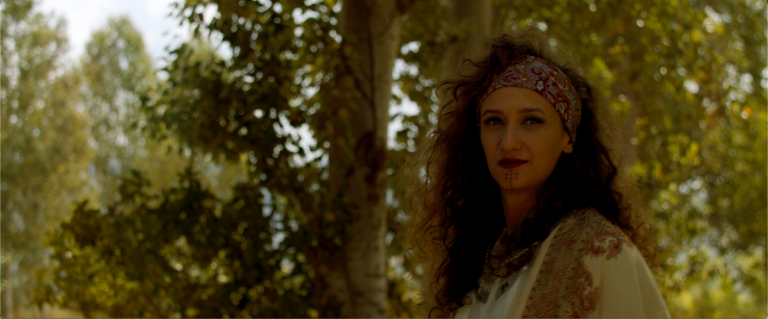
ما طال الطريق إلا لوهن نفسي/the road is only long because of the sparsity of my soul
فلما لا تلقاني، وأنت العزيز، في الوسط / Why don't you meet me instead, you who are mighty, in the middle?

The Song
The music was recorded, edited and mixed at Soundproof Studio in Mississauga by the talented Andre Mina.
There were 6 instruments: Riq, Mezher, Oud, Violin, Cello, and Qanun.
The music was recorded in full and not in parts. This meant that all 6 musicians played the entire song together. One tiny mistake meant having to start all over again.
The main vocalist was Illarra Riyad supported by 4 choir members: Rammah and Rula who are actual singers joined by Manar (the oudist) and Nawrooz (the cellist) to add depth and volume!
The Music Video
The music video was directed by Malak Zamzam who has the following to say about the experience:
The music video is an experimental project that follows our main character's spiritual journey (beautifully performed by the young talented Rawan A. Bayan) from oblivion to her final state of peace as soon as she finds what she was looking for. Throughout her journey, she receives small signs along the way that guides her, alongside the spirit of her ancestor performed with such groundedness and grace by the Awesome Tamara Christina Hawi. Her journey takes her to her final destination where we see the dervish performed professionally by the very talented Shadi Arar.
The video displays a lot of symbolism that is inspired by the Palestinian heritage, legends, and fiction as well as real stories of our ancestors.
We need your consent to load the translations
We use a third-party service to translate the website content that may collect data about your activity. Please review the details in the privacy policy and accept the service to view the translations.

